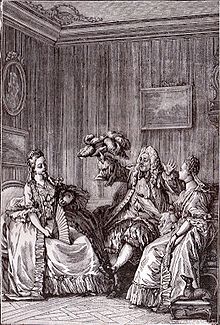The ridiculous precious ones
| Data | |
|---|---|
| Title: | The ridiculous precious ones |
| Original title: | Les Précieuses ridicules |
| Genus: | comedy |
| Original language: | French |
| Author: | Molière |
| Publishing year: | 1659 |
| Premiere: | November 18, 1659 |
| Place and time of the action: | Paris in the 17th century |
| people | |
|
|
The ridiculous precious (original title: Les Précieuses ridicules ) is a comedy by Molière , which was premiered on November 18, 1659 in the Théâtre du Petit-Bourbon . The one-act play was shown following the play Cinna by Pierre Corneille . The piece deals with the issue of preciosity in a satirical way. It has had great success since its premiere, both at the royal court and in the theaters of Paris. This was increased by the fact that Molière felt compelled to have his piece - the first of his works - printed himself after the publication of a pirated print.
Table of contents
The despotic patriarch Gorgibus wants to finally marry off daughter Magdelon and niece Cathos. Having moved to Paris for this purpose, Magdelon and Cathos want their lives to be like in a gallant novel . Gorgibus doesn't understand a word of what the young women are trying to explain to him verbatim and says in frustration: “ Quel diable de jargon entends-je ici? Voici bien du skin style. »(German:“ Devil too, what kind of talk is that supposed to be? It's probably the high style. ”) The first two admirers have already been turned away because they were not based on the Carte de Tendre , an allegorical map from the novel "Clélie" by Madame de Scudéry to solicit affection, but fell through the door and immediately proposed marriage. Cathos explains to her uncle: “ Je treuve le marriage une chose tout à fait choquante. Comment est-ce qu'on peut souffrir la pensée de coucher contre un homme vraiment nu? »(German:" I find marital status an utterly offensive thing. How can one bear the thought of sleeping side by side with a completely naked man? ") Deeply offended, the spurned disguise their servants as extravagant nobles. They turn the tables in a game of confusion and give the " pecques provinciales " (German: "stupid provincial geese ") to the laughter. The piece ends with a raging Gorgibus who, after all the anger and expenses that Magdelon and Cathos caused him through their coquetry, beats up a group of hired violinists and wishes all the novel-like literature to hell.

Cathos: Incredibly good.
Engraving by Moreau le Jeune .
